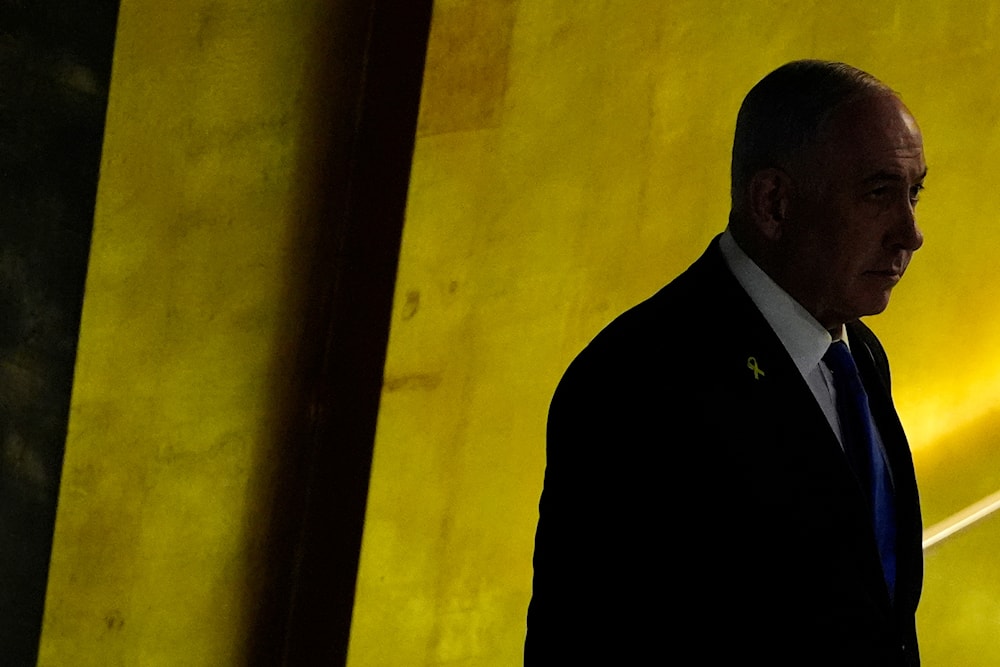Netanyahu's aggressive tactics could blow up 'Israel': The Guardian
The Guardian suggests that Netanyahu's arrogance and reckless decisions are not only destabilizing the region, but could ultimately backfire and blow up the occupation.
-

Israeli Prime Minister Benjamin Netanyahu enters the 79th session of the United Nations General Assembly, on September 27, 2024. (AP)
A piece published by The Guardian on Tuesday suggests that Israeli Prime Minister Benjamin Netanyahu is not looking for a ceasefire in Gaza and Lebanon, arguing against claims that the martyrdom of Hamas leader Yahya Sinwar would pave the way for a ceasefire. The report rather describes Netanyahu as a "reckless aggressor, wielding the power of US and UK-supplied weaponry," reveling in the chaos and destruction.
According to the piece, written by Simon Tisdall, The Observer's foreign affairs commentator, while Netanyahu, his allies, and a faction of Israeli settlers believe they are emerging victorious in the ongoing war, the reality is that these actions are likely to have serious repercussions. This situation unfolds against the backdrop of Netanyahu's escalating focus on Iran as his next target.
Netanyahu is bloodthirsty
Netanyahu is striving for maximum strength, reach, and leverage, partially to safeguard his political future, the report states. It notes that "Israel" has intensified its aggressive attacks against northern Gaza, despite Hamas being allegedly decapitated and reduced to sporadic acts of resistance.
The piece suggests that Netanyahu is willing to absorb the international backlash resulting from high civilian casualties in devastated areas like Jabalia. The reason for this, Tisdall argues, is that he lacks a coherent plan for the "day after" in Gaza. Instead, he is focused on maximizing Israeli control and securing his position before the moment arrives when he decides to end the war.
According to Haaretz, Netanyahu has dismissed advice from Israeli military leaders and US officials to use Sinwar's martyrdom as leverage for a captive deal. A senior Israeli hostage negotiator noted that the situation remains unchanged, "To a large extent, we’re in the same situation. The assassination didn’t create flexibility. The goals of the war haven’t changed with regard to ending Hamas’s rule. Consequently, the orders given to the defense establishment also haven’t changed."
Netanyahu's throne of arrogance
Demonstrating his disregard for peacemakers, Netanyahu has escalated his aggression to the UN on both political and military fronts, as stated by The Guardian. Last month, he gave a confrontational and offensive speech at the General Assembly, while also launching attacks on UNIFIL, the UN peacekeeping force in Lebanon. These assaults have led to injuries among peacekeepers and have also affected Lebanon’s army.
In a related context, The Guardian reported on Amos Hochstein's arrival in Beirut on Monday as the US peace envoy tasked with mediating a ceasefire based on UN Security Council resolution 1701.
However, his proposal included an Israeli demand for the right to re-intervene militarily, both on the ground and in the air, whenever it "feels threatened." This demand was rejected, as it undermines Lebanon's sovereignty. That said, such a demand only reflects the Israeli leadership's approach, the report suggests.
Just like the situation in Gaza, the situation in Lebanon reflects a similar strategy, the report stated, explaining that Netanyahu, aware that he cannot withstand international pressure indefinitely, seems determined to cause as much damage as possible to Hezbollah—both militarily and organizationally—while he still has the opportunity.
Bibi's tantrum and the US pacifier
Amid Netanyahu's hysteria, US Secretary of State, Antony Blinken made his way to the occupied territories, intending to talk Netanyahu into "limiting the targets, destructive power and escalatory, possibly nuclear-related madness of Israel’s imminent retaliatory strike against Iran", according to The Guardian.
Conversely, the report indicates that both Blinken and Netanyahu recognize that Biden is unlikely to take significant action to rein in "Israel" ahead of the November 5 US election. It also notes that there will be "no arms cut-off or punitive sanctions that could jeopardize votes for Democrats".
The piece states that Biden’s greatest concern at the moment is a potentially explosive confrontation between Iran and "Israel" that could escalate this week or next, drawing US forces into another "Middle East quagmire" just before voters face the choice between Kamala Harris and Donald Trump, explained The Guardian, highlighting that the upcoming US election serves as Netanyahu’s true focus, guiding his actions.
Consequently, it suggests that if Netanyahu is not pressured, he will continue to pursue his agenda in both Gaza and Lebanon for at least the next two weeks.
The report indicates that if Harris wins, the US might be able to impose terms due to her alleged concern for the "humanitarian impact of the war", though this would require political will that is currently lacking. Conversely, if Trump wins, Netanyahu will be in a strong position to dictate the timing and terms of any ceasefires and long-term agreements.
That said, the piece suggests that Netanyahu is stalling for this specific reason, keeping his bets on Trump being elected. However, Netanyahu forgot that Iran's response to the anticipated attack could change his plans. On that note, The Guardian characterized Netanyahu as "the brutal, reckless chancer" whose relentless brinkmanship has gone too far. The article warns that in the coming days, his violent tactics may finally backfire on him and "Israel".

 5 Min Read
5 Min Read










